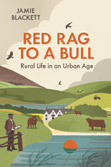|
RED RAG TO A BULL
Rural life in an Urban Age
by Jamie Blackett
|
 Jamie Blackett, a former officer in the Coldstream, won popular and critical acclaim with his first book The Enigma of Kidson: The Portrait of an Eton Schoolmaster. Encouraged by this success, Blackett has written an entertaining and engaging book on a subject that will resonate strongly with those who live and work in rural Britain. Jamie Blackett, a former officer in the Coldstream, won popular and critical acclaim with his first book The Enigma of Kidson: The Portrait of an Eton Schoolmaster. Encouraged by this success, Blackett has written an entertaining and engaging book on a subject that will resonate strongly with those who live and work in rural Britain.
If rural Britain is the ‘Bull’ in the book’s title, who is the ‘Red Rag’? Well, it’s the usual roundup of watermelons, whom Jamie refers to as the ‘Axis’: the liberal metropolitan elite, the media, Defra, the SNP, the animal rights lobby, the bureaucratic jobsworths, and all those MPs representing urban constituencies. But apart from the occasional rant against the ‘Axis’, this book has real merit as a piece of social history. You learn a lot and you can only admire Jamie as he describes, with good humour, his family’s tireless work to make ends meet in his Dumfriesshire estate.
Jamie refers to himself and his family as ‘Bonnet Lairds’ or ‘Hedgerow Knights’. It’s an apt and vivid image describing families with a certain amount of land, an ancient name, little money to talk of, and reliant on hand-me-down clothing. Friends from the South would come and stay and say, ‘Isn’t this wonderful, how blessed you are’. But with a seven-figure mortgage, an estate which was a one-trick pony, obligations to a community living and working together towards the common good, Jamie felt like he was clinging onto a log with his family sitting behind him being washed down a river in full spate.
Jamie grasped the bull by the horns. The ‘Big Hoose’ was sold, they moved to the house on the shore, he added a pedigree beef herd, reinvigorated the Dumfriesshire and Stewartry Hunt, re- calibrated the estate shoot, rustled up a B&B, renovated estate cottages to encourage tourism and made everything on the estate wash its face. Non-farm income is key. Wheat was £120 a tonne in 1973 when we entered the Common Market; it’s pretty much the same as we exit. The average income for a farmer in Dumfriesshire is around £12600 pa.
There were times in the ‘ uncertain hours’ when Jamie would lie wide awake agonising over this and that, and whether the malevolent hand of the government would get the better of him. He examines the SNP with a cold eye, its ability to exploit a hatred of the English and the narrative of Tory ‘misrule’. Still, Jamie has plenty of friends and wisdom to call upon. I enjoyed the record of his chats with Matt Ridley, a fellow estate owner and a Times columnist, whose commonsense approach to science and the environment is widely admired.
It’s a tricky book to structure, easy enough to ramble, but Jamie handles this with simple logic: summer, autumn, winter and spring. The seasons provide the hooks on which he hangs the daily vexations and occasional pleasures of an estate owner’s life. For those of us who spend more time on pavements than in fields, there’s a wealth of useful and educational stuff on which to reflect: selecting the right pedigree beef herd; training a pack of hounds and animal welfare; fishing and why salmon is disappearing from our rivers; why sparrows are becoming extinct; badgers - (Wind in The Willows did no one any favours. They kill, eat anything (especially hedgehogs) and spread disease).
And then there are the other headwinds. As the poet William Butler Yeats wrote, ‘The best lack all conviction, the worst are full of passionate intensity’. Jamie learns pretty quickly how to navigate his way through all the bureaucratic hurdles, ignorance and warped ideology. He could perhaps show a bit more balance as he tackles these foes. After all, commercial shoots, 500 bird days with range rovers and hedge fund helicopters, rogue landlords, the grotesque use of chemicals in farming in the 50s and 60s, shocking animal welfare abuses under the guise of ‘The Red Tractor’ farm scheme, and all the Colonel Gammons with their purple complexions and red trousers, are not good PR in the delicate balance that is contemporary Britain.
He’s good on hunting. I’ve only once been to a hunt, The South Shropshire, but I could not agree more with the Benedictine monk, Father Edward Corbould, who taught me history at Ampleforth and who gave the homily at the funeral of one of Jamie’s friends and said of his friend ‘He loved hunting because he knew instinctively that it was a way of bringing people together’.
Jamie writes fluently, particularly as he picks up the pace during the book. He misfires occasionally on his metaphors and sometimes forgets the principle of ‘show don’t tell’, i.e. ‘He smoldered with volcanic rage’. He could also do a little more on characterisation. Jamie is surrounded by some great characters, but you never get a sense of what makes them memorable. Perhaps less is best, however, when you’re describing loved ones, and I was certainly left with the impression that without his wife, Sheri, Jamie would have found getting the estate on its feet a lot more trying.
What would his legendary Eton history tutor, Michael Kidson, say about this book? Kidson never gave praise lightly, but he had innate empathy for his pupils and he would quietly applaud Jamie’s courage in writing an enjoyable book that does so much to educate.
Paul de Zulueta
Published by Quiller Publishing.
www.quillerpublishing.com
|
|